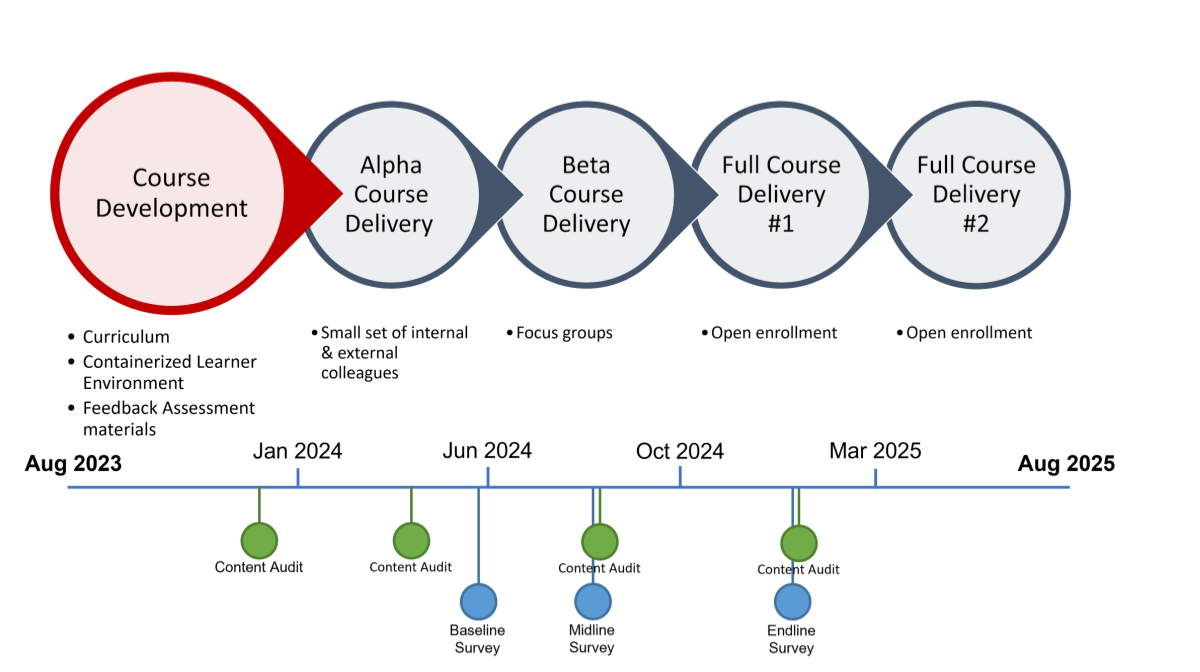Do you write code (maybe in R, maybe in Python)? Maybe you’re an agri-food scientist in a lab, or in a similar field in industry. Perhaps you’ve tried to write some code to get your work done, figuring you can run it on your laptop. But when you churn on that data you find after two weeks of keeping your laptop open to run the code that it’s probably not going to finish any time soon… Epiphany. You need to do this in a smarter way! Well you’re in luck – GEMS was just awarded a grant from NSF titled “Cyber Training: Pilot -- Breaking the Compute Barrier, Upskilling Agri-Food Researchers to Utilize HPC Resources” and you are exactly the audience we wish to reach with the courses we are developing.
The Team
The course material is being developed by an interdisciplinary team including:
- Instructor Joe Axberg, who works on supercomputing infrastructure by day but is also a part-time instructor after hours in the IT Infrastructure Program in the College of Continuing and Professional Studies.
- Project mastermind, Ali Joglekar, an agricultural economist by trade with real-world experience working with smallholder farmers in East Africa
- Kevin Silverstein, a cofounder of GEMS Informatics and expert bioinformaticist with specialties in molecular plant-microbe interactions and large-scale informatics problems
- Jesse Erdmann, systems architect and guiding force behind much of the inner workings of GEMS infrastructure.
- Ben Lynch, Director of MSI, with a long track record of innovating in the scientific computing domain
Scope
The proposal identifies 7 separate course modules that each contain a significant number of concepts, representing a broad swath of content to help up-skill agri-food researchers to use HPC:
- Introduction to High-Performance Computing (HPC) for Agri-Food Researchers
- Introduction to Cloud Computing for Agri-Food Researchers
- Hands-On: Use HPC to Analyze More Data and Faster
- Leveling-Up I: Expanding HPC Skills for Agri-Food Research
- Computer Science for the Agri-Food Researcher
- Leveling-Up II: Advanced HPC Concepts
- High Performance Workstations and Servers for Agri-Food Researchers
It is expected that the number of modules proposed and the content within each module may change as we build out the course and modules during the development phase(s). The goal of our iterative course development process is to refine this broad set of concepts and craft cohesive modules each with a duration of 2-6 hours of lecture materials (depending on the module). Some modules will span multiple weeks. Several rounds of purposeful learner feedback is integral to our course development process.
The course modules will also be “stackable” allowing learners to have some ability to “pick and choose” modules in line with their competencies and interests.

Timeline for delivery
As the diagram indicates, we are planning to offer each HPC for Agri-Food Researchers course over a 10-12 week period of time. The proposed course structure, in line with our other GEMS Learning offerings, includes asynchronous and synchronous instructional elements. Lecture materials will be delivered via videos and readings, which students are expected to review ahead of the weekly 1.5 hour class session. This instructor-led class time is primarily dedicated to synthesizing and reviewing the content being taught. To solidify learning objectives, students will be expected to engage in regular assessments and hands-on learning exercises outside of the weekly class session. We estimate that students will be responsible for 6+ hours/week of self-directed learning activities, depending on their skill-levels.
You can influence our content!
The good news is we are still in development, so you can influence these course offerings. Please fill out this survey now to make your voice heard!
